Home » Archives for March 2014
Piers Morgan says goodbye
Posted by Unknown
Scary jewelry heist caught on cam
Posted by Unknown
317 million reasons to love Obamacare
Posted by Unknown
Editor's note: Sally Kohn is a progressive activist, columnist and television commentator. Follow her on Twitter @sallykohn. The opinions expressed in this commentary are solely those of the author.
(CNN) -- More than 6 million Americans signed up for Obamacare before the March 31 deadline to get private health insurance through the Affordable Care Act exchanges. This is great news for the Obama administration.
But there are millions more reasons to celebrate Obamacare. Actually, at the writing of this essay, there are more than 317 million reasons — because that's the population of the United States of America and every single one of us can benefit from health care reform. How? Here's a rundown by the numbers:
3.1 million
 Sally Kohn
Sally Kohn That's how many young adults can get coverage because of the provision in Obamacare that allows them to stay on their parents' insurance plans until age 26.
105 million
That's how many Americans no longer have lifetime expense caps, whether it's because they have chronic illnesses or because their insurance company set restrictive policies.
6.1 million
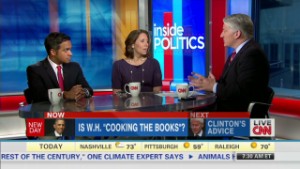 Inside Politics: Is WH "Cooking Books"?
Inside Politics: Is WH "Cooking Books"? 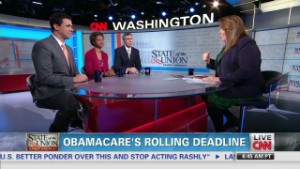 Obamacare enrollment reaches 6 million
Obamacare enrollment reaches 6 million That's how many Americans with Medicare Part D no longer have to go through the "doughnut hole" coverage gap. This means seniors can save more than $5.7 billion on prescription drugs.
3.2 million
That's the number of small businesses estimated to be eligible for tax credits for providing health insurance to their 19.3 million employees nationwide, credits worth $15.4 billion in 2011 alone.
4.4 million
That's how many low-income adults will now have access to health insurance thanks to states implementing the expansion of Medicaid under Obamacare; an additional 5.8 million poor adults would be included in this count if 25 mostly Republican-led states weren't refusing Medicaid expansion.
50 to 129 million
That's how many people will benefit from the Obamacare provision that eliminates all bars for coverage based on pre-existing conditions. Studies say that anywhere from 19% to 50% of non-elderly Americans have health conditions that could qualify as pre-existing conditions.
49.4 million
That's how many current Medicare enrollees can feel secure knowing that, under Obamacare, existing Medicare benefits can neither be reduced nor taken away.
317 million
-- That's how many Americans — i.e., all of us — potentially benefit from the requirement that insurance companies provide flu shots, HIV screenings, prostate exams, mammograms and FDA-approved contraception for free, without a co-pay.
-- Plus, we all benefit from new requirements that insurance companies must spend at least 80% of our premium dollars on our health care as opposed to marketing or administration.
-- We all benefit from the new requirement that insurance companies publicly justify their actions if they want to raise premiums by 10% or more.
-- We all benefit from knowing that our insurance can now never be capped or canceled at the whim of insurance companies.
As high quality care is maintained while costs may go down because of improved coverage and access, we all benefit from a more affordable and effective health care system.
What about, you ask, the estimated 4.7 million Americans who lost their current insurance plans during the rollout of Obamacare? Well, according to a congressional report, 2.35 million or so can take advantage of the Obama administration's decision to grandfather those plans through 2014.
Another 1.4 million qualify for Medicaid expansion or subsidies in the Obamacare exchanges. On top of that, the Obama administration has agreed that a "hardship exemption" built into health care reform for any American facing major challenges in complying with the law would be interpreted to include those whose policies had been canceled. In other words, they won't be penalized.
When Republicans rolled out stories of alleged Obamacare victims, the details were usually debunked in some way. The truth is that many of the canceled plans were no longer legal under Obamacare because they neither covered the basic things insurance should cover or, worse, were dangerously designed to explode the minute the insured got sick: what Consumer Reports has called "junk insurance."
Arguing that people should be able to keep these plans is like arguing that people should still be allowed to drive defective Chevy Cobalts or cars without seat belts. Like it or not, the government's job is to help keep us safe and insurance companies that were peddling shoddy products were doing the opposite.
Polls show most Americans want to keep Obamacare and work to fix it rather than replace or get rid of health care reform altogether. And there's much to suggest support for Obamacare would be even higher were it not for constant Republican attacks and misinformation about the law.
After all, when Americans find out what specific provisions are included in Obamacare, they overwhelmingly support them. Eighty percent support the extension of dependent coverage, 79% support closing the Medicare "doughnut hole," 77% support eliminating out-of-pocket costs for preventive services, 74% support the expansion of Medicaid. These Obamacare components are even supported by a majority of Republicans.
And it's still early. As more Americans access private health insurance choices through the exchange marketplace, receive care minus the discrimination and dirty tricks that insurance companies could get away with in the past, we'll see more people getting the medicine they need, screened for cancer sooner in more treatable stages and pay less for good care.
Every day, as we all see the benefits of health care reform in our lives, support for Obamacare will grow stronger. Before long, not even the most partisan Republicans will be able to attack it.
Follow us on Twitter @CNNOpinion.
Join us on Facebook/CNNOpinion.
Model: Why I came out as transgender
Posted by Unknown
Editor's note: Geena Rocero is an activist, a model, and the Founder of Gender Proud, a movement that aims to change the global perception of and conversation about transgender individuals. The opinions expressed in this commentary are solely those of the author.
(CNN) -- Monday is International Transgender Day of Visibility, and the day I have chosen to "come out" as transgender.
We are all assigned a gender at birth. Sometimes that assignment doesn't match our inner truth, and there needs to be a new place -- a place for self-identification.
I was not born a boy, I was assigned boy at birth. Understanding the difference between the two is crucial to our culture and society moving forward in in the way we treat -- and talk about -- transgender individuals.
One of my earliest memories is from 5 years old. I used to drape T-shirts on my head, and would delight in feeling the fabric on my back. My mom asked me, "why do you always wear a T-shirt on your head?" I responded, "It's not a T-shirt, Mom -- this is my hair."
Growing up the Philippines, I was involved in transgender beauty pageants from the age of 15. In Asian cultures, the fluidity of gender has been part of life for thousands of years, evidenced by the Buddhist Goddess of compassion, GuanYin and the Hindu hijra Goddess, Bahuchara Mata, who is sacred to men who want to be cured of impotence, and to women wanting to become pregnant.
Yet despite this nuanced understanding, and despite the pageant culture I grew up in, in many countries, fluidity is celebrated but not politically recognized.
 Legal victory for transgender student
Legal victory for transgender student 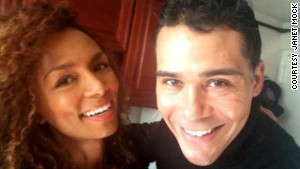 Mock: Disclosure is frightening
Mock: Disclosure is frightening  Is America ready for this top model?
Is America ready for this top model? A personal turning point came in 2005, a year before I became a U.S. citizen, when I was traveling through Tokyo. Back then, I still had my Philippines passport and my former male gender marker, but I presented as a woman. I was taken into the immigration office at the airport and questioned for hours about my identity. I have friends in the Philippines -- where there is no law that allows them to change their name and marker -- that have these experiences every time they travel. It's dehumanizing.
When I first moved to the United States to work as a model, and I finally had the opportunity to change my name and gender marker, I felt as though my outside self finally matched my inner truth. I really felt like I'd made it but, over time, I realized that there's a lot of work that needs to be done and that I was only just beginning.
Today I am launching Gender Proud, which envisions a world where transgender individuals are able to self-identify with the fewest possible barriers.
In most of the Western world, conceptions of gender remain very rigid, but that exists alongside progressive legal systems that afford transgender individuals some limited rights.
There are varying differences of understanding between Eastern and Western cultures, and I hope Gender Proud can create a new understanding. We are partnering with All Out to identify countries where legislation is at a "tipping point," and we plan to funnel resources to on-the-ground activists and organizations working to create change.
There's a long history of people within the community who stood up and fought for justice. I was inspired by the trailblazers, such as Marsha P. Johnson and Sylvia Rivera and by organizations, including the Association of Transgender in the Philippines, Transgender Europe, Global Action for Trans Equality, among others.
I believe that a more mature and in-depth contemplation of the subject of transgender will be the bridge that leads humanity to a deeper understanding of gender as a whole. This deeper understanding begins with the realization that we live in a culture that assigned us gender at birth and that the appropriate roles and expectations of our gender are defined by our society and our culture.
In today's globally connected and ever-diversifying world, culture is now more fluid and more flexible than ever -- and so too should be our understanding and perception of gender.
To learn more, please visit www.genderproud.com
Follow us on Twitter @CNNOpinion.
Join us on Facebook/CNNOpinion.
I got a better deal from Obamacare
Posted by Unknown
Editor's note: Paul Begala, a Democratic strategist and CNN political commentator, was a political consultant for Bill Clinton's presidential campaign in 1992 and was counselor to Clinton in the White House. He is a consultant to the pro-Obama Super PAC, Priorities USA Action. The opinions expressed in this commentary are solely those of the author.
(CNN) -- I signed up for health care through the Affordable Care Act last week.
I did so for one reason and one reason only: it was a good deal for my family. In fact, it was a better deal than we were getting before the ACA.
The website, which received so much (well-deserved) negative publicity when it failed to launch, is now easy-peasy. The options it generated for us were more clearly delineated than those we'd been given in the past by a private-sector insurance broker. The benefits were plainly spelled out, as were the deductibles and co-pays. We are fortunate in that we do not need subsidies, and yet the Obama exchange still found us a better deal than we had found on our own.
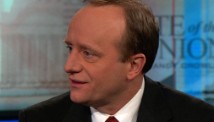 Paul Begala
Paul Begala Let me be clear: this was not a political statement. This is my family's health. If I got the best care by going through Sarah Palin's website I would do so. Besides, the business decisions in our family are made by my wife, who has both an MBA and a Masters in Public Administration. I haven't had a checkbook since the Reagan administration, but because this decision was so personal and consequential, we made it as a team.
In the end, it was not a tough choice. On the one hand, we got better coverage under the ACA. On the other, it cost less. I'm not exactly a believer in Republican talking points, but even I was surprised at how obviously superior my choices are under the new law. I knew there were no death panels, and I figured a plan originated by Newt Gingrich, the Heritage Foundation and Mitt Romney couldn't truly be Marxist. But I hadn't taken the time to do the math to figure whether the ACA would be a better deal for me. It is.
The federal health exchange served me better than the private sector had. So I signed up. My doc is still my doc. My insurance company is still a private corporation - not (gasp!) a government agency. (Although I'd sign up for Medicare today if they'd let me; the government-run health insurance program for seniors is terrific.) Bottom line is, the ACA works, period.
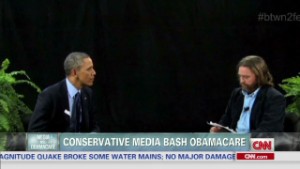 Grading media's coverage of Obamacare
Grading media's coverage of Obamacare  Inside Politics: Is six million enough?
Inside Politics: Is six million enough? 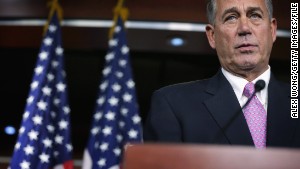 Boehner: 'What the hell is this, a joke?'
Boehner: 'What the hell is this, a joke?' And here's the beauty part: even if you choose not to use the exchanges at all, you stand to benefit from the Affordable Care Act. If you or someone in your family has a pre-existing condition, you are a winner under the ACA. Ditto if, God forbid, you have an illness or an accident that would have maxed-out your pre-Obamacare coverage limit: the ACA outlaws coverage caps. If you're a young adult who can now be covered on your parent's plan till age 26, or a Medicare patient who needs preventive care or has fallen into the Donut Hole, you come out ahead too.
Mitch McConnell: Another view on Obamacare
All of those rights -- and more -- would disappear if the Republicans repealed the Affordable Care Act. The Republican-controlled House has voted 54 times to do just that.
Despite spending millions on ads, the right is losing the debate. The latest Kaiser Family Fund poll shows that, even though the new health care law is still not popular, 59% of Americans want to keep the ACA as-is or modify it slightly. Only 18% want to repeal it altogether, and another 11% want to repeal it and replace it with a GOP alternative.
As more and more Americans actually deal with health reform firsthand, as they actually receive new rights and new benefits, and as the parade of right-wing horribles fails to materialize, I suspect support for the ACA will continue to grow.
As one of the millions of Americans who benefits from the ACA, I just want to say thanks, President Obama. And thank you, Nancy Pelosi, Harry Reid and everyone in Congress who voted for the Affordable Care Act. (Obviously, each person's individual situation is unique. It may well be that some folks will not share my positive experience. But you have nothing to lose by checking it out.)
Thanks also to all the Republicans who voted for it. Wait, there weren't any. That's okay, I suppose. There were no Republicans who voted for the Clinton Economic Plan in 1993, and it led to balanced budgets and 23 million new jobs. The Republicans of that time predicted doom and depression if the Clinton Economic Plan passed. Their successors are predicting the same about the Affordable Care Act. And they're going to look just as foolish in the eyes of history.
Follow us on Twitter @CNNOpinion.
Join us on Facebook/CNNOpinion.
Lessons, from Walter White to LBJ
Posted by Unknown
Editor's note: Julian Zelizer is a professor of history and public affairs at Princeton University. He is the author of "Jimmy Carter" and "Governing America." The opinions expressed in this commentary are solely those of the author.
(CNN) -- Walter White, the high school chemistry teacher turned meth dealer in the fictional TV series "Breaking Bad," would seem to have little in common with the real-life President Lyndon B. Johnson, who played a celebrated part in the passage of the Civil Rights Act 50 years ago.
Yet Bryan Cranston, who played White and now stars as LBJ in a Broadway play, sees a common thread: "They're both very powerful, strong-willed, smart and damaged. In both cases, ego had a large part of what downfall they had," Cranston said when I questioned him in a recent panel discussion.
Last week, I had the pleasure of taking a group of 50 Princeton students to the new Broadway play "All The Way," starring Cranston as Johnson. Written by the Pulitzer Prize-winning Robert Schenkkan, the play is a riveting portrait of one of the most important and controversial presidents in American history.
 Julian Zelizer
Julian Zelizer Besides great entertainment, "All the Way" also offers an excellent opportunity to think about some of the lessons we need to include in our civic education to younger Americans, some of the aspects of politics that often elude the textbooks. Among those lessons:
Insider politics can be good: The era of insider politics had its virtues. In Johnson's time, politicians came to Washington for most of their career, spending their adult lives in the city and displaying a true passion for the political process.
This is difficult to understand in the post-Watergate landscape, when most elected officials spend their time railing against Washington, trying as hard as possible to have as little do with Capitol Hill as possible. While many put down former President Jimmy Carter, most politicians still try to replicate the anti-politics campaign style that he perfected in 1976, where his major selling point was not being part of Washington's broken system. As a result of fundraising and cheap air travel, more politicians spend their time outside of the district or inside the halls of events filled with wealthy donors from whom they're trying to raise another buck.
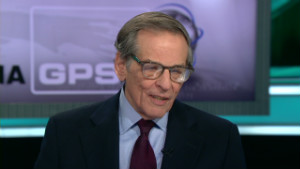 Caro on civil rights act
Caro on civil rights act 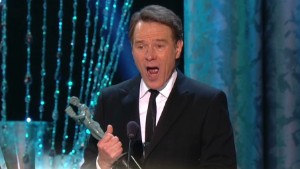 SAG win makes Bryan Cranston sing
SAG win makes Bryan Cranston sing 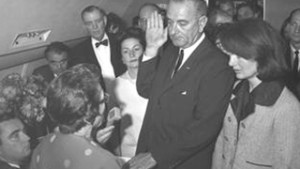 LBJ sworn in on Air Force One
LBJ sworn in on Air Force One 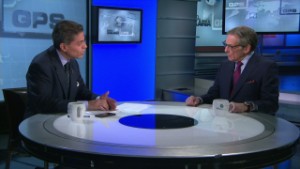 Caro: How JFK's death helped LBJ
Caro: How JFK's death helped LBJ  The evolution of Walter White
The evolution of Walter White Distrust in government is healthy and skepticism about Washington is well-deserved, but there was also something important about an era like the 1950s and 1960s when our nation's leaders lived and breathed the institutions of government.
In a long career in Washington, Johnson developed close relationships with other members of Congress and gained an intimate knowledge of all the issues, the history, and the arcane procedures that gave character to the city. His longstanding relationship with Republican Sen. Everett Dirksen, with whom he had worked closely throughout the 1950s when LBJ was Senate majority leader, enabled negotiations over civil rights to move forward.
Politics and policy are connected: Too often these days, politics is a dirty word. Television shows like "Scandal," "Homeland" and "House of Cards" all present politics as a power game replete with maneuvering and manipulation. (Sometimes life actually imitates art. Last week the House of Representatives took a "House of Cards"-style vote. When a bill looked like it was going to face defeat, the House Republicans pulled the bill from the floor and members went back to their offices, waiting to hear what would come next. While they waited, leaders from both parties sneakily brought the bill back to the floor for a quick vote. The bill passed as most members sat in their office having no idea what was taking place.)
But "All the Way" is a powerful reminder that politicians often use their ambition and ruthless drive for power productively. It might make you "squeamish," Cranston tells the audience in the final scene of the play, but this is how new policies are born.
LBJ is as manipulative as any character in "House of Cards," obsessing over power and willing to twist arms as far as they could go without breaking. But Schenkann captures something essential about LBJ and his allies on Capitol Hill: namely, that often power-craving politicians use that ambition toward higher ends.
The process is ugly, confusing, and messy. But in this case the product is something magnificent. The Civil Rights Act of 1964 was a "big f-ing deal," in the words that our current vice president, Joe Biden, used to describe President Barack Obama's health care reform. When all was said and done, the Civil Rights Act ended the system of racial segregation that had defined public life in the South since the end of Reconstruction.
Politics is about compromise: In today's political environment, compromise is a dirty word. We don't value leaders who adjust their positions in the pursuit of cutting deals, dismissing them as flip-floppers and sellouts.
"All the Way" is about the necessity of compromise to keep things moving. Johnson, as well as the Rev. Martin Luther King Jr. agree to huge compromises that anger their supporters -- including civil rights leaders and Vice President Hubert Humphrey -- by, for example, agreeing to exclude voting rights from the legislation. At one point, Cranston's Johnson explains, "This is not about principle. It's about votes!"
The costs of presidential hubris: Although the play focuses on the Civil Rights Act and election of 1964, the seeds of Johnson's destruction are planted in the early discussions of Vietnam surrounding the Gulf of Tonkin Resolution in August 1964, when Johnson's political fears of a right-wing backlash (against a president who might be depicted as refusing to stand firm against communism) led him deeper into the mire of Vietnam. Even as Humphrey warns Johnson against getting deeply involved in the faraway conflict, Johnson, at the height of his influence, is confident that he will be able to contain it.
This is one of the lessons of presidential history that is too often forgotten. We see again and again, especially in the realm of foreign policy, how president from both parties can go too far, believing they know best and insisting they can avoid the mistakes of their predecessors. Their decisions ultimately damage their legacy and the nation.
Sometimes popular culture doesn't have much to offer for the real world. But "All the Way" is a great history lesson for voters and politicians who are concerned about the quality of America's civic life.
Follow us on Twitter @CNNOpinion.
Join us on Facebook/CNNOpinion.
Want a job? Deliver, or protect
Posted by Unknown
Editor's note: CNN Contributor Bob Greene is a bestselling author whose 25 books include "Late Edition: A Love Story," "Duty: A Father, His Son, and the Man Who Won the War," and "Once Upon a Town: The Miracle of the North Platte Canteen," which has been named the One Book, One Nebraska statewide reading selection for 2014. The opinions expressed in this commentary are solely those of the author.
(CNN) -- If the trajectory of American daily life keeps heading in its current direction, the country may end up with only two dominant occupations:
-- Carrying stuff in boxes to people's houses.
-- And keeping a watchful eye on those same people so they don't hurt each other or steal things when they do leave their homes.
 Bob Greene
Bob Greene For all the talk about how e-commerce is outpacing the performance of traditional retail sales in brick-and-mortar stores, the men and women who could gain the most from the boom in online merchandising are not Web designers or those who come up with clever new shopping apps, but workers who perform one of the oldest jobs in the world:
Lugging packages from the curb to someone's front door.
It's one task that can't be accomplished in cyberspace. During the 2013 holiday season, according to the Wall Street Journal, retail stores drew only about half of the foot traffic that they did three years earlier. And during the peak holiday shopping period, online sales increased by more than double the rate of sales at traditional stores.
For every shopper who doesn't leave a store carrying a bag full of merchandise, but instead places orders online, there's someone who has to bring those items to the residence. And in the long run, the major beneficiaries of this shift in habits could very well turn out to be the people who undertake a decidedly low-technology endeavor: grabbing a box from the back of a truck and walking with it to a house.
You can already see the effects of this in statistics kept by the United States Postal Service. It's no secret that, in our era of e-mails and texts, the number of first-class letters delivered by the post office has plummeted. As recently as 2008, the Postal Service reported that it was delivering 90.7 billion letters annually. By last year, that number was down to 65.8 billion.
But the Postal Service's numbers for delivering packages, as opposed to letters, have actually gone up. In 2008, it delivered 3.3. billion packages; that had grown to 3.7 billion packages by last year. United Parcel Service says it delivers 16.3 million packages and documents worldwide every day -- 4.1 billion a year.
Some time-honored, pre-digital-era manufacturing firms have figured out a way to make the lug-the-package-to-the-house business model work for them, too. International Paper Co., according to the Journal, "is among the companies profiting from new digital habits. It bought several makers of corrugated cardboard boxes, which now fill with goods shipped by online retailers like Amazon. The Memphis-based paper company said it has a 35 percent market share."
But if carrying boxes is one line of work that has legs, another -- just as old-line -- may become even more in demand as the years go by. We can tell ourselves that our worlds are full of social media friends and amiable followers, yet the growth in industries devoted to protecting us from each other, both on the streets and in the electronic ether, betrays a certain distrust in the purportedly benign intentions of our fellow citizens.
It's not just the checkpoints at airports, and surveillance cameras on street corners, and cybercrime-fighting software offered by manufacturers; Samuel Bowles and Arjun Jayadev, writing in the New York Times, noted, "another dubious first for America: We now employ as many private security guards as high school teachers -- over one million of them, or nearly double their number in 1980. ... What is happening in America today is both unprecedented in our history, and virtually unique among Western democratic nations. The share of our labor force devoted to guard labor has risen fivefold since 1890."
This caution on the part of both citizens and industry may be warranted, but Bowles and Jayadev, reflecting on the melancholy underlying message of this, point out what philosopher John Stuart Mill wrote in 1848: "It is lamentable to think how a great proportion of all efforts and talents in the world are employed in merely neutralizing one another."
Neutralizing one another or, more cheerily, showing up bearing boxes. The Postal Service reports that its letter carriers and package-deliverers drive 4 million miles every day. UPS operates a delivery fleet consisting of 96,028 cars, vans, tractors and motorcycles, as well as 237 aircraft. As the inexorable shift to e-commerce becomes the standard way of shopping, those numbers can only be expected to increase.
And the private-security industry? That other growth field? There is an outside chance that it could eventually dwindle: if we should someday decide to put our faith in the sweet intentions and endless goodwill of our fellow citizens, both the ones we can see and the ones who invisibly make their way into our computers.
Until then, though, there is a multitude of home-security and break-in-alarm products for sale online.
And a multitude of men and women hired to carry them to the double-locked front door.
Follow @CNNOpinion on Twitter.
Join us at Facebook/CNNOpinion.
Gadhafi's son to Libya: I'm sorry
Posted by Unknown
Outrage over airline's baggage note
Posted by Unknown
Wake up to the reality of climate change
Posted by Unknown
Editor's note: Bill Richardson is the former governor of New Mexico, former U.S. ambassador to the United Nations, former U.S. Energy Secretary, and a current board member of the World Resources Institute, a global research organization on environmental issues. He serves on the boards or consults with companies in the energy field. The opinions expressed in this commentary are solely those of the author.
(CNN) -- "Nothing poses a bigger threat to our water, our livelihood and our quality of life than a warming climate." Those are my words from 2006 upon the signing of an executive order on climate change for New Mexico when I was governor.
Almost a decade later, this statement still holds true. But now we have even more information about climate change, both the risks and solutions.
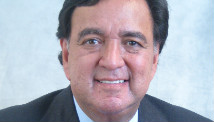 Bill Richardson
Bill Richardson The just-released report by the Intergovernmental Panel on Climate Change (IPCC), a collection of more than 800 leading climate scientists, reaffirms that climate impacts are already occurring and having a dramatic impact on society. Climate change is driven by our dependence on fossil fuels and is expected to get worse. In order to shift directions, we need nothing less than to rethink how we power our country.
Here's what we know:
The climate science is settled. The IPCC report is the latest addition to a staggering body of scientific research connecting our energy choices to costly climate disruption. The report is consistent with several other authorities -- such as the National Academy of Sciences, U.S. Global Change Research Program, and the National Oceanic and Atmospheric Administration -- that bring stronger language and greater certainty about climate change and its risks. Just as we know that smoking causes cancer, we understand that human activity causes climate change.
 deGrasse Tyson on climate change deniers
deGrasse Tyson on climate change deniers 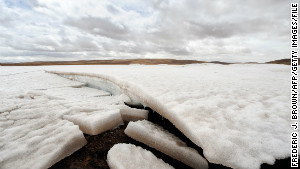 Climate change is not debatable
Climate change is not debatable  Expert: Sea levels make flooding worse
Expert: Sea levels make flooding worse Climate change is happening now and we are all feeling the effects. Earlier this month, the American Association of Advancement of Science reminded us that "climate change is happening here and now."
We are now witnessing how it is changing our world: The past winter was the eighth-warmest on record. For 348 consecutive months -- 29 years -- global temperatures have been above average.
The latest IPCC report finds that impacts from climate change are "widespread and consequential" and they are being felt on every continent and in our oceans. The world last year experienced 41 weather-related disasters that caused damages totaling at least $1 billion. Over the past decade, the western United States experienced seven times more large-scale wildfires than it did in the 1970s. Climate change has made it much more likely that we will suffer severe droughts like the one that recently swept across Texas and my home state of New Mexico.
Finally, without action, things will get a lot worse. As climate impacts mount, they will bring more damage to our economy and communities. Even 1 degree Celsius (1.8 degrees Fahrenheit) of global temperature rise could cut yields of crops like wheat, rice and corn, driving up food prices. Unless greenhouse gases are reined in, many more people will be at risk from devastating flooding, similar to what residents faced in Boulder, Colorado, last year. Overall, economic losses from climate change will cause a significant blow to the global economy, even at the lower end of climate projections.
So what can we do in the face of a changing climate?
Fortunately, local leaders, including mayors and governors, are responding to climate impacts and building more resilient communities. For example, city officials from Chicago to Miami are taking steps to reduce urban flooding with permeable pavement, dampen extreme heat with green roofs, and redesign levies to withstand stronger storm surges.
At the federal level, the Obama administration has called for additional funding for climate resilience and just unveiled a climate data initiative to arm communities with better information about climate change.
But, it's clear that we need to do more. According to the IPCC, by significantly reducing emissions we can avoid the worst consequences of climate change and cut economic damages by half.
We're making progress already. Americans are embracing clean energy, buying solar panels at a record pace as the price has plummeted by 80% in just four years. Many large companies, like Apple, Google and Walmart, are investing heavily in renewable energy. Even ExxonMobil is among dozens of U.S. businesses now operating with an internal price on carbon.
And important new emissions standards are coming. Under the U.S. Climate Action Plan the president announced last year, the Environmental Protection Agency is moving ahead with standards to reduce carbon pollution from existing coal-fired power plants -- the largest source of U.S. emissions. These rules are the most significant opportunity to cut U.S. emissions in the near term and will help the country play a leadership role in the run-up to a universal climate agreement in 2015.
The science tells us that much deeper reductions are needed in the decades ahead. Ultimately, a national price on carbon would be the most effective way to expedite a transition to a safer, low-carbon future.
The evidence is overwhelming: Further inaction guarantees disaster. Alternately, we can re-balance our energy mix and rise to the challenge of the 21st century. Let's hope that a decade from now we will look back with confidence that we stood up to the global climate crisis.
Follow us on Twitter @CNNOpinion.
Join us on Facebook/CNNOpinion.
Does Obama really understand Putin?
Posted by Unknown
Editor's note: Andrew C. Kuchins is director and senior fellow of the Russia and Eurasia Program at the Center for Strategic and International Studies in Washington. The opinions expressed in this commentary are solely those of the author.
(CNN) -- I recall being an undergraduate in Russian Studies at Amherst College when the Soviet Union invaded Afghanistan in December 1979. I was flabbergasted when then-President Carter initially expressed surprise that Leonid Brezhnev and his cronies decided to undertake that ill-fated adventure. Just the little I knew of Soviet history at that time led me to conclude that one should never be naïve about Russia. Wisely, the Carter administration soon implemented a wide-ranging and powerful set of sanctions against the USSR.
By comparison, Barack Obama is now making Jimmy Carter look like Attila the Hun with a series of empty threats and "too little, too late" punitive measures against Putin's Russia.
On February 28, President Obama warned Russia not to take military action against Crimea, and if he did so, serious "costs" would be imposed. A few weeks later, Crimea was annexed to Russia and virtually no serious "costs" have been incurred from U.S. sanctions.
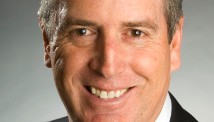 Andrew C. Kuchins
Andrew C. Kuchins Now Obama and our European allies have virtually conceded Crimea, but again warn Putin that we really mean it this time, that if you take military action in Ukraine outside Crimea, you will be really sorry!
I think the only thing that has surprised Putin is how weak Obama's response has been. The administration was not prepared for the contingency that Putin would act so brazenly.
But Obama's stubborn insistence on a measured, incremental approach seems premised on his belief that Putin will, after his frustration and anger clears, come to his senses and seize the proverbial "off ramp" Obama and his officials ritualistically refer to, hearkening back to nearly two years of the mantra, "Assad must go." We know that Assad never left, and I see no evidence that Putin wants to take the "off-ramp."
Surely Putin's goals were not limited to getting Crimea while losing Ukraine. That does not make sense. And since he has met virtually no push back for Crimea, why would he stop there?
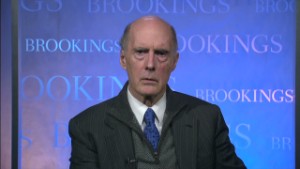 Putin's comparison to Kosovo 'bizarre'
Putin's comparison to Kosovo 'bizarre' 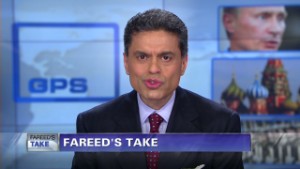 Fareed's Take: Putin's Crimea invasion
Fareed's Take: Putin's Crimea invasion  Putin calls Obama to talk about Ukraine
Putin calls Obama to talk about Ukraine It is not like his views on Ukraine are not fairly well known. At the Bucharest NATO summit in April 2008, Putin told George W. Bush in no uncertain terms that Ukraine was not a real country. And now Putin has found the appropriate moment to demonstrate to the "trans-Atlantic community" that Ukraine is not a real country by starting to dismember it with impunity.
In case there was any doubt about Putin's views of the illegitimacy of the post-Cold War European security order in Europe, his vitriolic speech to the Federal Assembly in Moscow on March 18 should clarify it for skeptics. I have no doubt that there is nothing Vladimir Putin would rather do than delegitimize the post-Cold War order, expose the Trans-Atlantic partnership as a sham and deeply degrade U.S. leadership in the world. He has already gone fairly far down that path in four weeks.
Why do American presidents have such a hard time understanding Russian leaders? First, it starts with our inability to fathom just how traumatic the collapse of the Soviet Union was for several generations of Russians. From a clinical standpoint, Russia has been suffering from post-traumatic stress disorder for the past couple of decades.
Putin resonates with many Russians because he is seen as the embodiment of the humiliation, status deprivation and grievances that the country has purportedly suffered.
Making matters worse, he was an intelligence operative virtually abandoned by what he and his brethren view as incompetent Soviet leadership. The ethos of the Russian intelligence officer going back to the foundation of the secret police in the early 19th century centers on their special, almost messianic obligation to save Russia from itself -- a task only they were adequately trained for.
These were people who, for example, enthusiastically supported the U.S. initiative more than 20 years ago to remove nuclear weapons from Belarus, Kazakhstan and Ukraine, not because they gave a damn about nonproliferation but because when the day came for Russia to restore the "Greater Russia," that task would be much easier with nukes out of the way.
In the 1990s, many speculated about the danger of a "Weimar Russia" scenario in which the humiliated superpower would re-emerge in more of a fascist form.
I am afraid that day has arrived. Putin's task is to take back what a certain streak of Russian nationalism views as not only rightfully, but sacredly, what should be Russian. Obama may satisfy some supporters and even some critics by taunting Putin and Russia as a "regional power" of no great consequence acting out of "weakness." This will only bait the bear to lash out to demonstrate who is really weak and who is strong. It is a game that Obama is not psychologically equipped to understand, let alone win.
A Russian strike, either after a manufactured provocation or without one, into eastern Ukraine, is inevitable. Putin smells blood in the water, and nothing we have said or done will deter him. Economic measures alone are insufficient.
If Obama does not rise to this challenge soon, I fear that Putin will happily ruin his legacy and U.S. credibility, with massive collateral damage for Russians and Ukrainians. Putin will likely meet his own end if he miscalculates in Ukraine. It is incumbent for the United States, its allies and most importantly Ukrainians themselves, to help Putin not miscalculate because if he does, there will be hell to pay for all of us.
Follow @CNNOpinion on Twitter.
Join us at Facebook/CNNOpinion.
LZ: Christian silence on gay hate
Posted by Unknown
Editor's note: LZ Granderson is a CNN contributor, a senior writer for ESPN and lecturer at Northwestern University. Commentary by the former Hechinger Institute fellow has been recognized by the Online News Association, the National Association of Black Journalists and the National Lesbian and Gay Journalists Association. Follow him on Twitter @locs_n_laughs. The opinions expressed in this commentary are solely those of the author.
(CNN) -- Pope Francis sent shockwaves around the globe last July when in addressing the issue of gays in the church, he opted not to remind his 1.6 billion followers about the fiery pits of hell but instead posed a question: who am I to judge?
Not exactly a ringing endorsement for equality but the rhetorical question was light years away from what we have grown accustomed to hearing from his predecessors. And because of that, we felt a glimmer of hope that maybe the needle within the larger Christian community had moved from hostile rhetoric to civil engagement.
 LZ Granderson
LZ Granderson Maybe even tolerance.
In their nearly one-hour meeting this week, Pope Francis and President Barack Obama reportedly spent the bulk of their time discussing empathy.
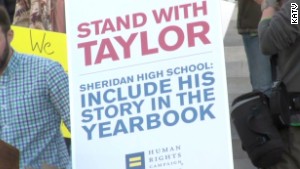 Community rallies around gay student
Community rallies around gay student 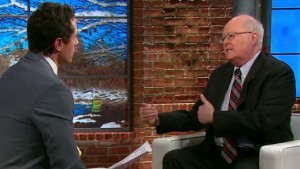 Catholic: 'We're being besieged'
Catholic: 'We're being besieged' 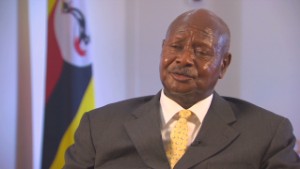 Ugandan President: Being gay not a right
Ugandan President: Being gay not a right  Gay Ugandans committing suicide
Gay Ugandans committing suicide "It's the lack of empathy that makes it very easy for us to plunge into wars," the President said afterwards.
Presumably he was referring to military wars though that sentiment is obviously applicable to the culture war as well.
For only a lack of empathy could prompt officials at a Christian school in Virginia to suggest an 8-year-old girl attend a different school because she wasn't behaving in a feminine enough way to stay at theirs. (The school says it can't provide details because of confidentiality but "this matter is far beyond a simple 'hairstyle and tomboy issue' as inaccurately portrayed.")
Only a lack of empathy could lead Catholic school officials to fire a beloved teacher for planning to marry the love of his life. A lack of empathy is the reason why "The "700 Club's" Pat Robertson can be flippant about stoning gay people to death in the days of Jesus or lead Franklin Graham -- Billy Graham's son -- to suggest that LGBT people might adopt children in order to "recruit."
All of these incidents occurred after Pope Francis asked "who am I to judge?" as if ostracizing an elementary school tomboy was the best answer some of the Christian faith had to that question.
On the day the story of the little girl made national headlines, Dan Haseltine, lead singer for the Christian band Jars of Clay, tweeted, "why do I find myself regularly shaking my head, or rolling my eyes at supposed Christian leaders." He followed with, "I am learning that love's most potent manifestation happens when we make room at the table for everyone."
Love's most potent manifestation happens when we make room at the table for everyone.Dan Haseltine
Haseltine's remarks were refreshing because many Christians in his position prefer silent disapproval in response to over-the-top quotes and head-scratching stories like the one involving the little girl. If you're curious why more and more people are leaving the church maybe it's because they hear "love the sinner but hate the sin" from the pulpit -- and then see so many followers go about their day as if simply saying the word "love" excused them from actually having to show any.
Many followers of Christ may find silence on this topic easier, not noticing silence is being interpreted as endorsements -- whether they agree with the anti-gay rhetoric or not. For each time "Who am I to judge?" is asked, an anti-gay quote from the Catholic League's Bill Donahue is there to answer.
To move Pope Francis' question from a global headline to global change, Christians must stop allowing silence to be the de facto weapon of choice against the senseless persecution of gay people.
Forty percent of the country's homeless youth identify as LGBT, with nearly half kicked out of their homes by those who are supposed to love and care for them. There's a sermon topic we don't hear every week -- but we should.
Slave owners used to start and end each service on the plantation with Ephesians 6:5 -- "Servants, be obedient to them that are your masters according to the flesh, with fear and trembling, in singleness of your heart, as unto Christ."
"Who am I to judge?" was not enough to change that.
Women were once compelled to stay with abusive husbands with the words "wives, submit yourselves unto your own husbands, as unto the Lord."
"Who am I to judge?" was not enough to empower women and get the legal system to prosecute their assailants.
It was in such silence that laws in Uganda were originally drafted to make being gay punishable by death. Laws that found validation from the ties some Ugandan politicians had to well known U.S. evangelicals who regularly visited the country. The evangelicals have since distanced themselves from the anti-gay politics of Uganda. But not because of some moral stirring within their soul but because they were called out on it.
Because the silence ended.
Cardinal Timothy Dolan -- when asked about NFL prospect Michael Sam coming out of the closet -- said on NBC's "Meet The Press," "The same Bible that tells us that teaches us well about the virtues of chastity and the virtue of fidelity and marriage also tells us not to judge people."
A truism that is ignored way too often by anti-gay Christian leaders. A truism that isn't reiterated enough by those who follow them.
Follow us on Twitter @CNNOpinion.
Join us on Facebook.com/CNNOpinion.